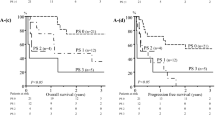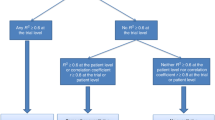Abstract
Purpose
Patients with locally advanced or metastatic differentiated thyroid cancer (DTC) have a variable prognosis, and the development of more effective treatment strategies is an important research topic. Overall survival (OS) is the gold standard for research endpoints in randomized controlled trials (RCTs), but observing an OS benefit requires the inclusion of a large number of patients and a long follow-up period. In this study, we aimed to investigate whether progression-free survival (PFS) could be used as a surrogate endpoint for OS in locally advanced or metastatic DTC clinical trials.
Materials and methods
We conducted a search in the PubMed and EMBASE databases to include all RCTs of locally advanced or metastatic DTC and extracted survival data. A weighted linear regression analysis was performed to explore the correlation between PFS benefit and OS benefit by taking the logarithm of the hazard ratios (HRs) of PFS and OS for each trial with a base of 10 and weighted by the number of patients in each RCT.
Results
Seven RCTs, including 1410 patients, were included. At the trial level, PFS benefit was weakly correlated with OS benefit (R2 = 0.210, 95% CI: 0.000–0.811) and did not meet the statistical criteria for the surrogate endpoint.
Conclusion
This study does not support PFS as a surrogate endpoint for OS in locally advanced or metastatic DTC clinical trials.
Trial registration
PROSPERO Identifier: CRD42022334898




Similar content being viewed by others
Data availability
All datasets generated during and/or analyzed during the current study are available from the corresponding author on reasonable request.
References
M. Li, L. Dal Maso, S. Vaccarella, Global trends in thyroid cancer incidence and the impact of overdiagnosis. Lancet Diabetes Endocrinol. 8(6), 468–470 (2020). https://doi.org/10.1016/S2213-8587(20)30115-7
H. Lim, S.S. Devesa, J.A. Sosa, D. Check, C.M. Kitahara, Trends in thyroid cancer incidence and mortality in the United States, 1974-2013. JAMA 317(13), 1338–1348 (2017). https://doi.org/10.1001/jama.2017.2719
C.D. Seib, J.A. Sosa, Evolving understanding of the epidemiology of thyroid cancer. Endocrinol. Metab. Clin. N. Am. 48(1), 23–35 (2019). https://doi.org/10.1016/j.ecl.2018.10.002
M. Schlumberger, S. Leboulleux, Current practice in patients with differentiated thyroid cancer. Nat. Rev. Endocrinol. 17(3), 176–188 (2021). https://doi.org/10.1038/s41574-020-00448-z
J. Jonklaas, N.J. Sarlis, D. Litofsky et al. Outcomes of patients with differentiated thyroid carcinoma following initial therapy. Thyroid 16(12), 1229–1242 (2006). https://doi.org/10.1089/thy.2006.16.1229
M. Shoup, A. Stojadinovic, A. Nissan et al. Prognostic indicators of outcomes in patients with distant metastases from differentiated thyroid carcinoma. J. Am. Coll. Surg. 197(2), 191–197 (2003). https://doi.org/10.1016/S1072-7515(03)00332-6
C. Durante, N. Haddy, E. Baudin et al. Long-term outcome of 444 patients with distant metastases from papillary and follicular thyroid carcinoma: benefits and limits of radioiodine therapy. J. Clin. Endocrinol. Metab. 91(8), 2892–2899 (2006). https://doi.org/10.1210/jc.2005-2838
M.S. Brose, J.W.A. Smit, C.C. Lin et al. Multikinase inhibitors for the treatment of asymptomatic radioactive iodine-refractory differentiated thyroid cancer: global noninterventional study (RIFTOS MKI). Thyroid 32(9), 1059–1068 (2022). https://doi.org/10.1089/thy.2022.0061
M. Savina, S. Gourgou, A. Italiano et al. Meta-analyses evaluating surrogate endpoints for overall survival in cancer randomized trials: a critical review. Crit. Rev. Oncol. Hematol. 123, 21–41 (2018). https://doi.org/10.1016/j.critrevonc.2017.11.014
F. Fiteni, V. Westeel, X. Pivot, C. Borg, D. Vernerey, F. Bonnetain, Endpoints in cancer clinical trials. J. Visc. Surg. 151(1), 17–22 (2014). https://doi.org/10.1016/j.jviscsurg.2013.10.001
M. Gion, J.M. Pérez-García, A. Llombart-Cussac, M. Sampayo-Cordero, J. Cortés, A. Malfettone, Surrogate endpoints for early-stage breast cancer: a review of the state of the art, controversies, and future prospects. Ther. Adv. Med Oncol. 13, 17588359211059587 (2021). https://doi.org/10.1177/17588359211059587
M. Buyse, G. Molenberghs, Criteria for the validation of surrogate endpoints in randomized experiments. Biometrics 54(3), 1014–1029 (1998)
M. Buyse, G. Molenberghs, T. Burzykowski, D. Renard, H. Geys, The validation of surrogate endpoints in meta-analyses of randomized experiments. Biostatistics 1(1), 49–67 (2000). https://doi.org/10.1093/biostatistics/1.1.49
W. Xie, S. Halabi, J.F. Tierney et al. A systematic review and recommendation for reporting of surrogate endpoint evaluation using meta-analyses. JNCI Cancer Spectr. 3(1), pkz002 (2019). https://doi.org/10.1093/jncics/pkz002
FDA: Table of surrogate endpoints that were the basis of drug approval licensure. https://www.fda.gov/drugs/development-resources/table-surrogate-endpoints-were-basis-drug-approval-or-licensure. Accessed 15 June 2022
D. Moher, A. Liberati, J. Tetzlaff, D.G. Altman; PRISMA Group, Preferred reporting items for systematic reviews and meta-analyses: the PRISMA statement. BMJ 339, b2535 (2009). https://doi.org/10.1136/bmj.b2535
J.P. Higgins, D.G. Altman, P.C. Gøtzsche et al. The Cochrane Collaboration’s tool for assessing risk of bias in randomised trials. BMJ 343, d5928 (2011). https://doi.org/10.1136/bmj.d5928
S. Leboulleux, L. Bastholt, T. Krause et al. Vandetanib in locally advanced or metastatic differentiated thyroid cancer: a randomised, double-blind, phase 2 trial. Lancet Oncol. 13(9), 897–905 (2012). https://doi.org/10.1016/S1470-2045(12)70335-2
M.S. Brose, C.M. Nutting, B. Jarzab et al. Sorafenib in radioactive iodine-refractory, locally advanced or metastatic differentiated thyroid cancer: a randomised, double-blind, phase 3 trial. Lancet 384(9940), 319–328 (2014). https://doi.org/10.1016/S0140-6736(14)60421-9
M. Schlumberger, M. Tahara, L.J. Wirth et al. Lenvatinib versus placebo in radioiodine-refractory thyroid cancer. N. Engl. J. Med. 372(7), 621–630 (2015). https://doi.org/10.1056/NEJMoa1406470
Chi Y, Gao M, Zhang Y, et al. LBA88 Anlotinib in locally advanced or metastatic radioiodine-refractory differentiated thyroid carcinoma: a randomized, double-blind, multicenter phase II trial. Ann Oncol. 31 (2020). https://doi.org/10.1016/j.annonc.2020.08.2332
Y. Lin, S. Qin, Z. Li et al. Apatinib vs placebo in patients with locally advanced or metastatic, radioactive iodine-refractory differentiated thyroid cancer: the REALITY randomized clinical trial. JAMA Oncol. 8(2), 242–250 (2022). https://doi.org/10.1001/jamaoncol.2021.6268
M.S. Brose, B. Robinson, S.I. Sherman et al. Cabozantinib versus placebo in patients with radioiodine-refractory differentiated thyroid cancer who have progressed after prior VEGFR-targeted therapy: results from the phase 3 COSMIC-311 trial. J. Clin. Oncol. 39, 6001–6001 (2021). https://doi.org/10.1200/JCO.2021.39.15_suppl.6001
Y. Chi, M. Gao, Y. Zhang et al. Anlotinib in radioiodine-refractory differentiated thyroid carcinoma: a subanalysis based on ALTER01032 study for patients with poor baseline characteristics. J. Clin. Oncol. 39, 6022–6022 (2021). https://doi.org/10.1200/JCO.2021.39.15_suppl.6022
J.C. Del Paggio, J.S. Berry, W.M. Hopman et al. Evolution of the randomized clinical trial in the era of precision oncology. JAMA Oncol. 7(5), 728–734 (2021). https://doi.org/10.1001/jamaoncol.2021.0379
P.A. Tang, S.M. Bentzen, E.X. Chen, L.L. Siu, Surrogate end points for median overall survival in metastatic colorectal cancer: literature-based analysis from 39 randomized controlled trials of first-line chemotherapy. J. Clin. Oncol. 25(29), 4562–4568 (2007). https://doi.org/10.1200/JCO.2006.08.1935
N.R. Foster, Y. Qi, Q. Shi et al. Tumor response and progression-free survival as potential surrogate endpoints for overall survival in extensive stage small-cell lung cancer: findings on the basis of North Central Cancer Treatment Group trials. Cancer. 117(6), 1262–1271 (2011). https://doi.org/10.1002/cncr.25526
A. Mauguen, J.P. Pignon, S. Burdett et al. Surrogate endpoints for overall survival in chemotherapy and radiotherapy trials in operable and locally advanced lung cancer: a re-analysis of meta-analyses of individual patients’ data. Lancet Oncol. 14(7), 619–626 (2013). https://doi.org/10.1016/S1470-2045(13)70158-X
I.F. Tannock, G.R. Pond, C.M. Booth, Biased evaluation in cancer drug trials-how use of progression-free survival as the primary end point can mislead. JAMA Oncol. 8(5), 679–680 (2022). https://doi.org/10.1001/jamaoncol.2021.8206
M. Merino, Y. Kasamon, M. Theoret, R. Pazdur, P. Kluetz, N. Gormley, Irreconcilable differences: the divorce between response rates, progression-free survival, and overall survival. J. Clin. Oncol. 41(15), 2706–2712 (2023). https://doi.org/10.1200/JCO.23.00225
J. Ahn, E. Song, W.G. Kim et al. Long-term clinical outcomes of papillary thyroid carcinoma patients with biochemical incomplete response. Endocrine 67(3), 623–629 (2020). https://doi.org/10.1007/s12020-019-02142-1
B. Barres, A. Kelly, F. Kwiatkowski et al. Stimulated thyroglobulin and thyroglobulin reduction index predict excellent response in differentiated thyroid cancers. J. Clin. Endocrinol. Metab. 104(8), 3462–3472 (2019). https://doi.org/10.1210/jc.2018-02680
Y. Wang, J. Wu, L. Jiang, X. Zhang, B. Liu, Prognostic value of post-ablation stimulated thyroglobulin in differentiated thyroid cancer patients with biochemical incomplete response: a bi-center observational study. Endocrine 76(1), 109–115 (2022). https://doi.org/10.1007/s12020-021-02976-8
Author contributions
Conceptualization: X.X.; Methodology: S.Y., J.Z.; Formal analysis and investigation: S.Y., J.Z.; Writing - original draft preparation: S.Y., J.Z.; Writing - review and editing: X.X.
Funding
This study is supported by the National Natural Science Foundation of China (32071436) and the Beijing Municipal Natural Science Foundation (7222127).
Author information
Authors and Affiliations
Corresponding author
Ethics declarations
Conflict of interest
The authors declare no competing interests.
Additional information
Publisher’s note Springer Nature remains neutral with regard to jurisdictional claims in published maps and institutional affiliations.
Rights and permissions
Springer Nature or its licensor (e.g. a society or other partner) holds exclusive rights to this article under a publishing agreement with the author(s) or other rightsholder(s); author self-archiving of the accepted manuscript version of this article is solely governed by the terms of such publishing agreement and applicable law.
About this article
Cite this article
Yang, S., Zhan, J. & Xu, X. Evaluation of progression-free survival as a surrogate endpoint for overall survival in locally advanced or metastatic differentiated thyroid cancer: a systematic review. Endocrine 82, 491–497 (2023). https://doi.org/10.1007/s12020-023-03507-3
Received:
Accepted:
Published:
Issue Date:
DOI: https://doi.org/10.1007/s12020-023-03507-3




